2023
On January 12, 2023, FDC announced a successful outcome in a long-running federal lawsuit regarding Close Management and other forms of restricted housing:
CLOSE MANAGEMENT LAWSUIT
Three years after filing a federal class action lawsuit, Southern Poverty Law Center, Florida Legal Services, and the Florida Justice Institute dropped their unjustified case and paid the Florida Department of Corrections (FDC) more than $210,000 in legal costs. The class action complaint alleged FDC engaged in unconstitutional solitary confinement of approximately 10,000 inmates. FDC refuted these assertions, noting the vast majority of these inmates were in double occupancy cells and experienced frequent human interaction and programming.
Florida Department of Corrections Secretary Ricky Dixon said, “While I respect other reasonable viewpoints on the use of restrictive housing, decisions must inherently be left up to experienced corrections leaders who are ultimately responsible for managing the nation’s most dangerous criminals – not activist groups representing frequently distorted, inaccurate, and deficiently supported ideologies that risk serious threat to staff and the majority of the inmate population alike. Whether for disingenuous or well-intended purposes, failure to properly secure and house an individual inmate who has proven to be dangerous and violent - asserting that doing so would negatively impact his or her mental capacity - is not only irresponsible but prioritizes that individual’s wellbeing over the lives of hundreds of staff and other inmates. Further, Plaintiffs inaccurate definition of double occupancy cells as ‘solitary confinement’ is a gross distortion of the English language and exposes the activists’ agenda as nothing more than emotional manipulation.”
Plaintiffs’ counsel reviewed millions of pages of documents and toured numerous facilities. The search was fruitless, and Plaintiffs’ counsel ultimately moved to dismiss the case with prejudice.
Florida inmates housed in restrictive housing are separated from the general population for reasons of safety, security, or the management of the institution, due to the actions of these inmates. This is not solitary confinement, as most inmates are placed with a cellmate. If the inmate is housed alone, he or she is not isolated from human contact. The number of inmates in long-term restrictive housing represents 5% of the total inmate population.
For the past several years, public interest groups driven by activists, […] have engaged in a nationwide effort to limit the options correctional professionals have in managing the most difficult and violent inmates.
“The use of restrictive housing is not ‘one size fits all,’ and a number of variables impact its necessity within prison systems,” Secretary Dixon continued. “It is ill-advised to allow public interest groups to unreasonably limit the options of corrections professionals in dealing with violent inmates. I commend our legal team for their diligent work on the case.”
FDC takes seriously the mandate to protect the public, its staff, and the inmates in its charge from the most dangerously volatile inmates in state custody, and this mandate is carried out in a constitutional manner.
Unfortunately, incidents like the following are commonplace in corrections settings, and in the past, were not often prosecuted.
BATTERY OF A FDC OFFICER
On January 31, 2023, while incarcerated at Martin Correctional Institution, inmate Jonathan Daniels commits a battery of a FDC Officer. The officer is injured as the result of the battery. Inmate Daniels is arrested by FDC-OIG and charged with a violation of Florida State Statute 784.07(2)(b), Battery of a Law Enforcement Officer and a violation of Florida Statute 843.01, Resisting an officer with violence against his or her person. Both charges are felonies with a minimum sentence of 5 years imprisonment.
 FDC appoints its first official Statewide Female Services Administrator, Yolanda Lanier. In this groundbreaking role, Mrs. Lanier will take a holistic view of the treatment and program needs of female inmates. Under the direction of the Assistant Deputy Secretary of Institutions, she will be responsible for reviewing the daily operations and associated policies, procedures, and programs at the four female correctional institutions and five female community release centers throughout the state. Lanier started her career in Corrections as a Correctional Officer, working her way up to Classification Officer through stints at six facilities in three regions throughout the state. She earned a Bachelor’s degree in criminal justice from Saint Leo University.
FDC appoints its first official Statewide Female Services Administrator, Yolanda Lanier. In this groundbreaking role, Mrs. Lanier will take a holistic view of the treatment and program needs of female inmates. Under the direction of the Assistant Deputy Secretary of Institutions, she will be responsible for reviewing the daily operations and associated policies, procedures, and programs at the four female correctional institutions and five female community release centers throughout the state. Lanier started her career in Corrections as a Correctional Officer, working her way up to Classification Officer through stints at six facilities in three regions throughout the state. She earned a Bachelor’s degree in criminal justice from Saint Leo University.
On February 15, 2023 Governor Ron DeSantis signs a bill ending a unanimous jury requirement in death penalty sentencing, in response to a verdict that spared the life of a school shooter who killed 17 people in 2018 at Marjory Stoneman Douglas High School in Parkland, Florida. The new law, which went into effect as soon as the governor signed it, allows capital punishment in Florida with a jury recommendation of at least 8-4 in favor of execution.
EXECUTION
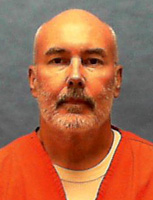 February 23 - Inmate Donald Dillbeck is executed, after 31 years on death row. (His is the first execution in Florida since 2019.) The murder that led him to death row is of significance to FDC, because it led to a shift in the way FDC operates its work release program, even though Quincy Vocational Center (QVC) was not a work release center.
February 23 - Inmate Donald Dillbeck is executed, after 31 years on death row. (His is the first execution in Florida since 2019.) The murder that led him to death row is of significance to FDC, because it led to a shift in the way FDC operates its work release program, even though Quincy Vocational Center (QVC) was not a work release center.
When the murder occurs in 1990, Dillbeck is housed at QVC, a unique facility near Tallahassee where inmates are taught how to cook for large events and trains inmates to be cooks at the prisons. The inmates provide meals for government and community groups, and often cater the events with correctional officers overseeing them. QVC is closed after inmate Dillbeck walks away from a catering event and murders a woman at a Tallahassee Mall while trying to steal her car. Dillbeck is a close custody inmate (pending a custody reduction) serving a life sentence with a minimum mandatory 25 years for another murder he committed prior to the Tallahassee murder. The fact that an inmate serving a life sentence for murder is able to walk away from his job outside prison fences incenses the public and Governor Martinez. As a result, all work release centers in Florida are revamped and all inmate’s custody levels are scrutinized. Any inmate who is serving a minimum mandatory sentence of any kind (whether it be a drug charge, robbery, firearm use or murder, for example) is designated close custody and is therefore made ineligible for work release. In addition, numerous FDC employees are either fired or suspended if they had any input at all in the decision to allow Dillbeck to work at Quincy Vocational Center. Today, the minimum mandatory restriction has been lifted, but inmates must be community custody (the lowest level of custody) to be eligible for work release. Today, any inmate with a conviction for murder under s.782.04 is ineligible for work release, regardless of their custody level. Sex offenders have never been eligible, and continue to be ineligible. Inmates must also be within 14-19 months of release, have no detainers, or escape history, along with numerous other restrictions.
Even though HB 7057 made it illegal for individuals to knowingly and willfully operate a drone over a state prison, offenders continue to try to introduce contraband in this manner. It didn’t work out so well for one former inmate, who will be returning to his former residence - FDC custody.
FORMER FLORIDA INMATE ARRESTED FOR USING DRONES TO TRAFFIC NARCOTICS INTO CORRECTIONAL FACILITIES
 JACKSONVILLE, Fla. — The Florida Department of Corrections (FDC) announced the arrest of former Florida inmate Mario Brian Crawford, 33, on multiple charges, including the introduction of contraband, operation of an unmanned aircraft over a critical infrastructure facility, trafficking in methamphetamine, and possession of cocaine.
JACKSONVILLE, Fla. — The Florida Department of Corrections (FDC) announced the arrest of former Florida inmate Mario Brian Crawford, 33, on multiple charges, including the introduction of contraband, operation of an unmanned aircraft over a critical infrastructure facility, trafficking in methamphetamine, and possession of cocaine.
The Jacksonville Sheriff's Office arrested Crawford on an Office of the Inspector General (OIG) warrant from Escambia County. A search of Crawford's rental vehicle produced evidence supporting his ongoing criminal activity including a drone and contraband packaging materials. Crawford is among others suspected of being involved in a larger-scale operation of contraband introduction into multiple Florida correctional institutions using drones.
"Contraband threatens officers and inmates alike, and when it comes to cell phones, the threat often extends outside the prison gate. Contraband cell phones impede the ability for our staff to manage a safe and secure institution. This arrest is part of a broader Department mission and represents the successful disruption of a criminal contraband introduction network across Florida," said FDC Secretary Ricky Dixon. "In this instance, an excellent collaborative investigation among Department and local agencies led to multiple charges and prevented contraband from entering into more correctional institutions."
The use of contraband cell phones not only circumvents FDC's security practices but provides an avenue for illegal drug use, extortion, and human trafficking by offering inmates a route for unmonitored communications, jeopardizing the safety of the public, staff, and inmates. Since July 2012, FDC has seized more than 76,400 cell phones. Currently, FDC is working with federal, state, and local partners to reverse the federal law prohibiting cell phone jamming technology - a frequency used to render cell phones unusable within the compounds of an institution.
Crawford was released from FDC custody in 2021 after serving a seven-year sentence for trafficking in stolen property and grand theft and is currently under supervision for a case in Georgia.
In March 2023, FDC obtains final judgment in its favor in a federal case brought by the Human Rights Defense Center, publisher of Prison Legal News. Plaintiffs in the case took issue with FDC’s rejection of their publications based on the contents of certain advertisements contained therein. After conducting a trial, the court finds that FDC’s application of its admissible reading rule continues to meet constitutional muster.
DESANTIS SIGNS BILL ELIMINATING UNANIMOUS JURY DECISIONS
FOR DEATH SENTENCE
By Sydney Kashiwagi, CNN
Published 4:02 PM EDT, Thu April 20, 2023
Florida’s Gov. Ron DeSantis signed a bill Thursday that will no longer require juries to agree unanimously to recommend death sentences, reducing the number of jurors needed to recommend a death sentence to the lowest threshold of any state with capital punishment. SB 450 reduces the number of jurors needed to recommend a death sentence from 12 to 8.The bill was prompted by a jury’s decision last year to not hand the death penalty to Parkland school shooter Nikolas Cruz. A jury recommended Cruz receive a life sentence without the possibility of parole instead for the February 2018 shooting at Florida’s Marjory Stoneman Douglas High School. Of the 12 jurors in Cruz’s trial, three voted against the death penalty.
COMMUNITY CORRECTIONS CIRCUIT 13 LAUNCHES FIRST
PROBATION OFFICER BIKE UNIT
Two women are the first probation officers in the state to complete the International Police Mountain Bike Association (IPIMBA) Public Safety Cyclist Course, in anticipation of being the first state probation officers to form a bike unit. The 32-hour certification course prepares officers to work the street from a bicycle. This course involves outdoor activities including day and night open street rides, closed course obstacle navigation, scenarios, and basic maintenance.
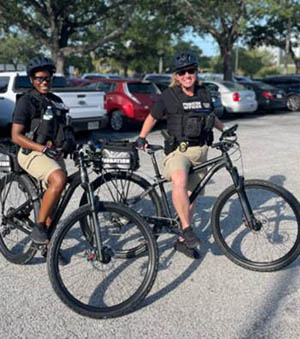
High Risk Specialist (HRS) Christine Ashcraft (on right) and HRS Patrice Hill (on left), who both volunteered for the Bike Unit, will also participate with local law enforcement bike units for events in the community that felony offenders may frequent, such as parades, concerts, and recruiting opportunities.
The goal of the bike unit is to provide an efficient way to make field contacts with offenders on community supervision, while improving community relations in and near offender residences and employment. The first unit is operating in Circuit 13, which is Hillsborough County and the Tampa area, where it is densely populated with apartments, condominiums and high-rise buildings, and some of these communities often have multiple offenders living in the area.
These women are also the first two probation officers to join ranks with local police officers who serve on their bike units. Since these officers do not have the protection of a vehicle to retreat to should problems arise, they have been prepared to defend themselves from a threat if unable to deescalate the situation. Working with our law enforcement partners, these probation officers are trained in specific officer safety tactics for conducting supervision via bicycle.

PROBATION OFFICE ON WHEELS IN PALM BEACH COUNTY
As part of a $2 million grant from the John D. and Catherine T. MacArthur Foundation to the Palm Beach County's Criminal Justice Commission (PBCCJC), Community Corrections (Circuit 15) was awarded $55,000 to purchase a mobile bus and the necessary equipment to outfit a 'Probation Mobile Unit' to be used for adult, felony offenders on supervision in Palm Beach County.
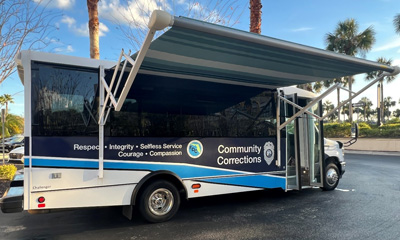
Many probationers have no means of transportation, which can lead to difficulty in keeping their appointments at the probation office. This information led to a review that determined that a large percentage of violations of probation (VOPs) were due to failing to report to the probation office as instructed. This violation could lead offenders back to jail. To reduce the number of VOP’s for this condition, assist in reducing the overcrowding of Palm Beach County jail, and to assist probationers, Community Corrections requested a mobile probation unit. The mobile unit will target various community locations throughout Palm Beach County and allow offenders to report there as opposed to traveling to the probation offices.
The Probation Mobile Unit rolled out in 2023. Designated community reporting sites have been established with the cooperation of the Palm Beach County Sheriff’s Department. All designated reporting sites are county-owned properties with ample parking, central locations, and are safe for officers. All locations are equipped with public facilities.
Drug testing is being conducted using oral swabs. If an offender tests positive, they are instructed to immediately report to their assigned probation office to provide a urine sample. A lobby staging area has been set-up using tents, folding tables, and folding chairs, all of which are transported to the location via the mobile unit.
This is how the unit is set up:
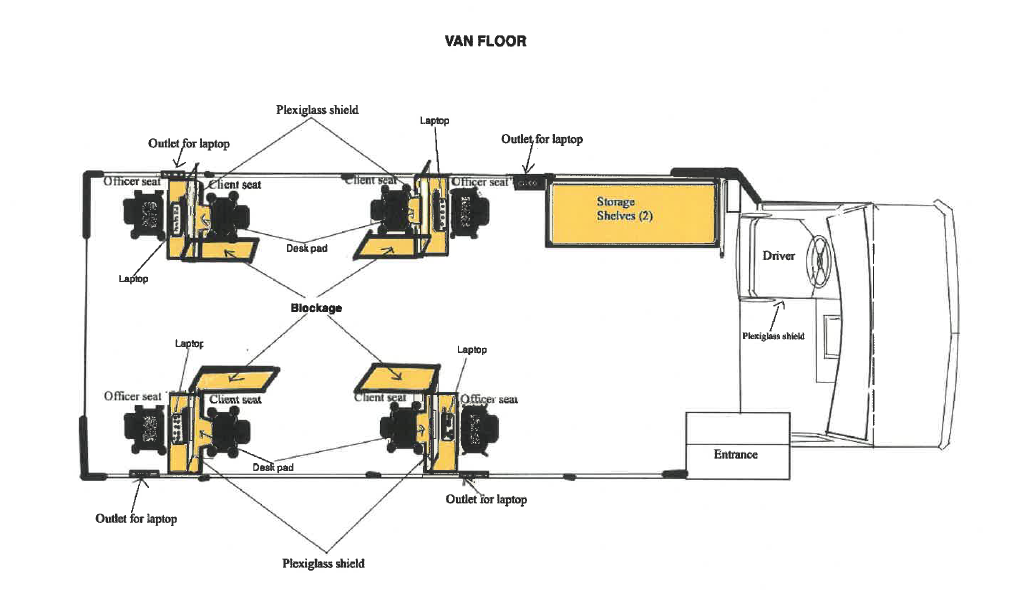
It should be noted that, in August 2023, the American Probation and Parole Association requested that the mobile unit be featured in the lobby at their Annual Institute in New York City, as it is the first mobile unit in existence in the eastern United States.
A second mobile unit is also being secured. Charles & Margery Barancik Foundation board approved $2.4 million in grants, and the Florida Department of Corrections was given approximately $130,000 of that grant money for an additional Mobile Supervision Unit (see pictures below). Funds are being used to create a fully mobile probation unit that will travel throughout the 12th Judicial Circuit (Sarasota area), making it easier for those reporting for probation.
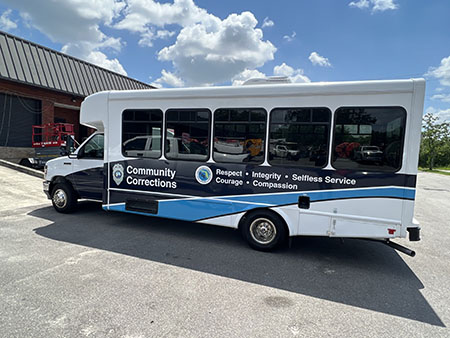
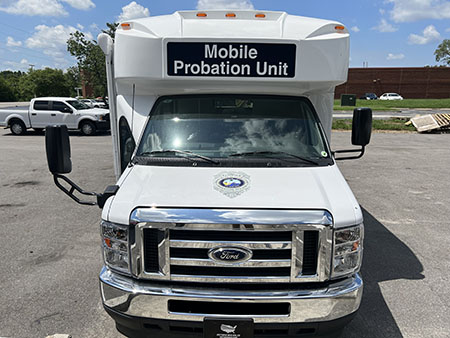

Hurricane Idalia made landfall in Keaton Beach in Taylor County as a Category 3 on August 30, 2023 at 7:45 a.m. With maximum sustained winds at 125 mph, Idalia brought heavy rains and over 6 feet of storm surge to northwest Florida's coastal cities. The Florida Department of Corrections evacuated more than 4,800 prisoners from nearly three dozen facilities statewide ahead of Hurricane Idalia, moving inmates to more robust buildings better equipped to survive what were expected to be dangerous conditions.
AUDIT REPORT INDICATES PRISON SYSTEM IS “UNSUSTAINABLE”
WITHOUT INCREASED FUNDING
According to a report from an auditing firm hired by FDC to create a 20-year master plan for the Department, Florida’s prison system is “unsustainable” long term, unless billions of dollars are injected into it for building repair, staffing and at least one additional prison. KPMG suggested three plans, depending on whether the state plans to (1) modernize, (2) manage, or (3) mitigate the problems in its prisons. All three options call for building at least one new prison and hundreds of hospital beds, and reopening dorms closed previously due to understaffing, at a cost ranging from $6 to $12 billion. Secretary Dixon noted that the report addresses issues that have been on the Department’s radar for some time.
There are six executions in 2023. They are:
- Donald Dillbeck (32 years on death row),
- Louis Gaskin (33 years on death row),
- Darryl Barwick (30 years on death row),
- Duane Owen (37 years on death row);
- James Barnes (16 years on death row), and
- Michael D. Zack III (26 years on death row).
- 1821-1845
- 1868-1876
- 1877-1895
- 1900-1919
- 1921
- 1922-1924
- 1927
- 1928-1931
- 1932 | CHAPMAN
- 1933-1935
- 1936-1939
- 1940-1945
- 1946-1949
- 1950-1955
- 1956-1961
- 1962 | WAINWRIGHT
- 1963-1965
- 1966-1969
- 1970-1975
- 1976-1979
- 1980-1986
- 1987 | DUGGER
- 1988-1990
- 1991 | SINGLETARY
- 1992-1995
- 1996-1998
- 1999 | MOORE
- 2000-2002
- 2003 | CROSBY
- 2004-2005
- 2006 | MCDONOUGH
- 2007
- 2008 | MCNEIL
- 2009-2010
- 2011 | BUSS
- 2011 | TUCKER
- 2012 | CREWS
- 2013-2014
- 2014 | JONES
- 2015-2018
- 2019 | INCH
- 2020-2021
- 2021 | DIXON
- 2022-Today
- Population Summary Table

